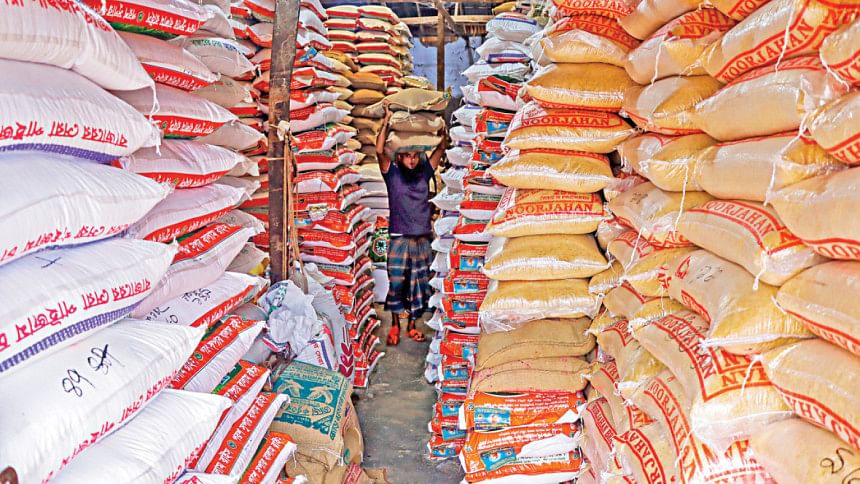Is jute the answer to our plastic problem?

Plastic bags, particularly single-use plastics, have become a major cause for environmental pollution in Bangladesh. Additionally, in urban areas, plastic waste accumulates on the roads, in footpaths, and public places. It also clogs drainage systems, leading to waterlogging and flooding during the monsoon. Plastic waste is polluting rivers and canals, too, harming aquatic ecosystems.
Rural areas, often overlooked in discussions about plastic pollution, are also severely affected. Plastic bags and other waste are frequently discarded in fields and open spaces, leading to the degradation of soil quality, which affects agricultural productivity. Moreover, plastic waste can contaminate water sources, posing serious health risks to the rural populations. This underscores the urgent need for sustainable alternatives like jute packaging.
In recent times, the interim government of Bangladesh has prioritised the production of environmentally sustainable jute bags to replace plastic bags in transportation and marketing. The feasibility of mandatory jute packaging has been dependent on consumer awareness and economic factors. Despite its eco-friendly nature, jute's practical application and cost-effectiveness in modern packaging solutions are essentially considered.
The introduction of mandatory jute packaging is not just an environmental initiative, but also a significant economic opportunity. It will positively impact the economy by creating employment, particularly in rural areas, and potentially reducing poverty. The Export Promotion Bureau (EPB) reported that the export of jute and jute products earned $912 million in FY2022-23. This indicates that a rise in demand for jute sacks will not only promote production, but also safeguard the jute industry, thereby protecting the environment.
Bangladesh enacted the Mandatory Jute Packaging Act, 2010 to address this situation. This law is aimed at reducing the use of single-use plastic bags and protect against environmental pollution. Section 4 of the act states that no product prescribed under this act can be sold, distributed or supplied without being wrapped in jute packaging.
As per Section 12 of the act, any product packaged violating the law will be confiscated. And according to Section 14, if any person who violates the law and instead uses artificial wrapping for selling, distributing or supplying products prescribed under the law, they will be subject to imprisonment not exceeding one year or a fine not exceeding Tk 50,000 or both.
The Mandatory Jute Packaging Rules, 2013, meanwhile, aims to promote the jute industry and reduce environmental pollution by requiring the use of jute packaging for specific products. This rule stipulates the mandatory use of jute packaging for products like paddy, rice, wheat, corn, fertiliser, sugar, chilli, turmeric, onion, ginger, garlic, pulses, coriander, flour, potatoes, and bran. Legal action can be taken against those who use plastic bags for these products.
In 2002, Bangladesh banned the production, use, marketing, and transportation of polythene bags under the Environmental Conservation Act, 1995, due to their harmful environmental impact. Subsequently, initiatives were undertaken to promote eco-friendly jute bags as an alternative.
However, despite all these efforts, the desired results have yet to be achieved due to inadequate enforcement of the rules and law. Due to widespread availability of plastics, many traders resist switching to jute packaging, often perceived as less convenient and more expensive. Unfortunately, harmful polythene remains prevalent, from street vendors to shopping malls. Even small items purchased from the local groceries are frequently given in polythene bags, as are products such as rice, pulses, fish, meat, and vegetables.
Polythene is non-biodegradable; it damages soil quality. Burning polythene releases harmful carbon monoxide gas into the air. Weak enforcement and a lack of accountability have emboldened violators to continue disregarding the law. According to a World Bank report from December 2021, there was a significant increase in daily plastic waste generation in Dhaka, from 178 tonnes in 2005 to 646 tonnes in 2021. This surge occurred despite the ban on polythene production, which is still carried out by around 1,500 factories, mainly located in Old Dhaka.
Due to the influence of unscrupulous traders and polythene factory owners, these factories cannot be closed outright. They provide employment to many people, and sudden closure could lead to a spike in unemployment, which would be detrimental to the country's economy. Even if the government decides to close these factories, it must be done gradually and thoughtfully.
To ensure compliance, it is crucial that the government amends the existing law to require jute packaging for all mills and imposes stricter penalties, including licence revocation. Furthermore, to enforce the mandatory use of jute packaging, the authorities should increase the number of mobile courts conducting regular inspections. This will send a strong message to violators and deter future non-compliance.
It is imperative to revive the lost tradition of jute in our economy and encourage the widespread use of eco-friendly jute products. The Mandatory Jute Packaging Act, 2010 is a significant law, but its implementation needs to be improved. To ensure its success, it is imperative to raise public awareness and encourage active participation of the government, businesses, and citizens. By addressing these issues, Bangladesh can significantly reduce plastic pollution and promote sustainable practices.
Atiqur Rahaman is apprentice lawyer at the District and Sessions Judge's Court, Dhaka and a human rights activist.
Views expressed in this article are the author's own.
Follow The Daily Star Opinion on Facebook for the latest opinions, commentaries and analyses by experts and professionals. To contribute your article or letter to The Daily Star Opinion, see our guidelines for submission.

 For all latest news, follow The Daily Star's Google News channel.
For all latest news, follow The Daily Star's Google News channel. 










Comments